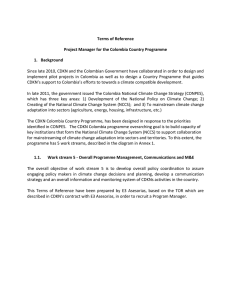Word version - Planet Under Pressure
advertisement
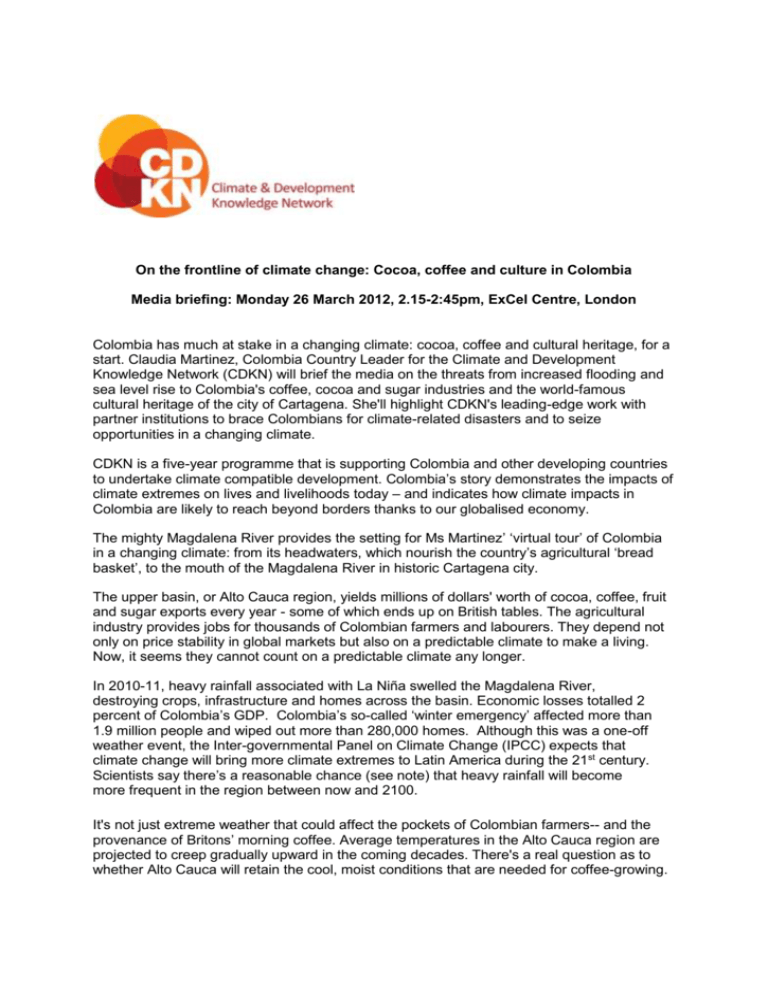
On the frontline of climate change: Cocoa, coffee and culture in Colombia Media briefing: Monday 26 March 2012, 2.15-2:45pm, ExCel Centre, London Colombia has much at stake in a changing climate: cocoa, coffee and cultural heritage, for a start. Claudia Martinez, Colombia Country Leader for the Climate and Development Knowledge Network (CDKN) will brief the media on the threats from increased flooding and sea level rise to Colombia's coffee, cocoa and sugar industries and the world-famous cultural heritage of the city of Cartagena. She'll highlight CDKN's leading-edge work with partner institutions to brace Colombians for climate-related disasters and to seize opportunities in a changing climate. CDKN is a five-year programme that is supporting Colombia and other developing countries to undertake climate compatible development. Colombia’s story demonstrates the impacts of climate extremes on lives and livelihoods today – and indicates how climate impacts in Colombia are likely to reach beyond borders thanks to our globalised economy. The mighty Magdalena River provides the setting for Ms Martinez’ ‘virtual tour’ of Colombia in a changing climate: from its headwaters, which nourish the country’s agricultural ‘bread basket’, to the mouth of the Magdalena River in historic Cartagena city. The upper basin, or Alto Cauca region, yields millions of dollars' worth of cocoa, coffee, fruit and sugar exports every year - some of which ends up on British tables. The agricultural industry provides jobs for thousands of Colombian farmers and labourers. They depend not only on price stability in global markets but also on a predictable climate to make a living. Now, it seems they cannot count on a predictable climate any longer. In 2010-11, heavy rainfall associated with La Niña swelled the Magdalena River, destroying crops, infrastructure and homes across the basin. Economic losses totalled 2 percent of Colombia’s GDP. Colombia’s so-called ‘winter emergency’ affected more than 1.9 million people and wiped out more than 280,000 homes. Although this was a one-off weather event, the Inter-governmental Panel on Climate Change (IPCC) expects that climate change will bring more climate extremes to Latin America during the 21st century. Scientists say there’s a reasonable chance (see note) that heavy rainfall will become more frequent in the region between now and 2100. It's not just extreme weather that could affect the pockets of Colombian farmers-- and the provenance of Britons’ morning coffee. Average temperatures in the Alto Cauca region are projected to creep gradually upward in the coming decades. There's a real question as to whether Alto Cauca will retain the cool, moist conditions that are needed for coffee-growing. Fitting the scientific parts of the puzzle - which crops are likely to thrive in which zones? with the socioeconomic parts - how can even the poorest households plan for change? - is the task of CDKN with its partner institutions Centre for International Tropical Agriculture (CIAT), CENICAFE (National Institute of Coffee Research), Universidad del Cauca and Universidad del Valle as well as Instituto de Hidrologia, Meteorologia y Estudios Ambientales (IDEAM). Ms Martinez will describe how the organisations are marrying climatic, agronomic and socioeconomic approaches to create roadmaps for the future, here in the land of sugar and coffee. “It’s always the poor who suffer the most from climate change,” says Ms Martinez, “so we are looking at ways to reduce risks for them and make their futures more secure. But we also live in a global economy where Colombia is the world’s third largest coffee exporter and the Alta Cauca región produces 90 percent of the country’s coffee. That means climate change could affect Colombia’s exports – and what’s available to consumers worldwide.” Downstream, at the mouth of the Magdalena River in Cartagena city, heavy rainfall and a swollen river carry similar risks to lives and property as they do in the Alto Cauca. But here, the ancient heart of the town, a UNESCO World Heritage Site, is threatened by coastal erosion and encroaching sea water, too. Ms Martinez will explore how forward-thinking civic leaders in Cartagena are putting climate change resilience at the heart of city planning. They are producing an adaptation plan that will include both ‘hard’ measures such as preventing development in areas endangered by sea level rise and flodding, and ‘soft’ measures such as mangrove restoration. It’s an integrated approach that can offer lessons to coastal cities the world over. Please join us for this short briefing from Colombia, on the frontline of climate change, and to learn more about the work of the Climate and Development Knowledge Network. - ENDS – Contact: Mairi Dupar, Global Public Affairs Coordinator, CDKN; email: mairi.dupar@odi.org.uk; tel: +44 (0) 7921 088475. The briefing will take place at 2.15pm on Monday 26 March at the Planet Under Pressure Conference: Press Conference Room, Excel Centre East, London E16 1XL. Claudia Martinez Zuleta formerly served for four years as the Deputy Minister of Environment of Colombia, and was subsequently chosen as Vice President for Social and Environmental Development at the Andean Development Bank (CAF). She is the founder and director of E3 – Ecology, Economics and Ethics. E3 is an advisory service company working to support public and private corporations in the promotion and application of principles of ecology, economy and ethics. She is a member of the board of the Centre for International Forestry Research (CIFOR), Tropenbos International and the Yale University Environmental Leadership Council. Ms. Martinez will be available for interview during and after the press conference, and will be reachable in the UK until Thursday 29th March. EDITORS NOTES: About the Climate and Development Knowledge Network The Climate and Development Knowledge Network (CDKN) supports decision makers in designing and delivering climate compatible development. It does this by combining research, advisory services and knowledge sharing in support of locally owned and managed policy processes. CDKN works in partnership with decision makers in the public, private and non-governmental sectors nationally, regionally and globally. CDKN is managed by an alliance of six organisations that brings together a wide range of expertise and experience: PricewaterhouseCoopers (PwC), the Overseas Development Institute (ODI), Fundación Futuro Latinoamericano, SouthSouthNorth, LEAD (International and Pakistan) and INTRAC. CDKN is a five-year programme supported by the UK’s Department for International Development (DFID) and the Netherland Ministry of Foreign Affairs. Please visit www.cdkn.org for more information. About the Magdalena River Basin The Magdalena river basin covers 274,000 km2, almost a fourth of Colombia’s territory. It is home to two-thirds of Colombia’s population. The basin produces 86% of the gross domestic product (GDP), generates 75% of the country’s agricultural production and is the source of more than 90% of the country’s coffee production. Colombia is the world’s third largest coffee producer after Brazil and Vietnam; and it is the second largest producer of the high quality arabica beans. Bloomberg reported on Colombia’s low coffee production in 2009 and 2011 due to adverse weather conditions, which affected international prices and caused headaches for global retailers (http://www.businessweek.com/news/2011-10-24/colombiacoffee-crop-may-miss-forecasts-after-bad-weather.html) The last year’s crop was down to 8.5 million bags, more than ten percent below expected production levels (http://colombiareports.com/colombia-news/economy/20679-colombia-coffee-productionlikely-flat-in-2011-12-growers.html ) As well as causing floods and making coffee berries drop from their branches, the torrential rains hastened the spread of a damaging fungus in the coffee crop. About the IPCC SREX report The IPCC Special Report: Managing the Risks of Extreme Events and Disasters to Advance Climate Change Adaptation (SREX) is released in full on 27 March 2012. The Summary for Policymakers is available on http://ipcc-wg2.gov/SREX The Report’s scientific authors have reviewed the available evidence on climate change impacts worldwide and models for projected impacts in the remainder of the 21st century. They find with medium confidence (defined as ‘about a five out of ten chance’) that extreme rainfall is likely to become more frequent in the Amazon subregion, including Colombia, over the course of the century. A ‘one in 20 years’ extreme rainfall event, as experienced at the end of the 20th century, will become a ‘one in 10 years’ event by 2050, assuming the world continues on current emissions pathways.


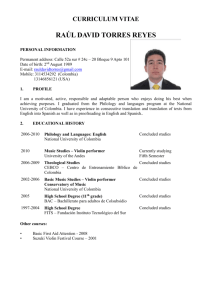

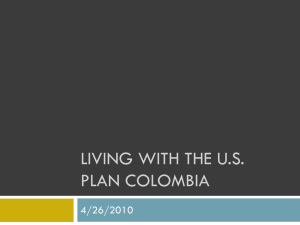
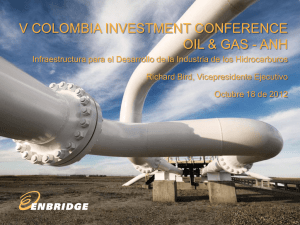
![저기요[jeo-gi-yo] - WordPress.com](http://s2.studylib.net/store/data/005572742_1-676dcc06fe6d6aaa8f3ba5da35df9fe7-300x300.png)

